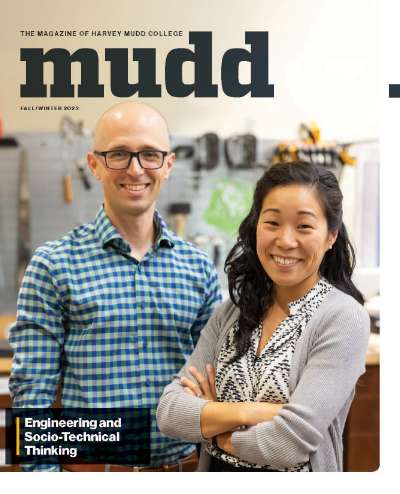Harvey Mudd Receives Bronze Rating for Sustainability Performance
June 15, 2018
Improving building operations. Reducing waste and greenhouse gas emissions. Teaching sustainability and promoting it in leadership and innovation. These are some of the metrics that feed into the comprehensive Sustainability Tracking, Assessment & Rating System (STARS) system used by more than 450 colleges and universities worldwide to establish benchmarks and measure their progress toward becoming sustainable institutions of higher education.
Recently, Harvey Mudd College received its first rating—a bronze certification.
Led by the Hixon Center for Sustainable Environmental Design, the work encompassed compiling data on more than 68 indicators and relied on input from virtually all functional units of the campus, including the Office of Facilities and Maintenance, Dining Services and the Office of Business Affairs. Louis Spanias, sustainability program manager and acting director of the Hixon Center, guided the work during 2017–2018. “Producing the report the first time is the hardest, but it helps identify where we’re coming from and how far we can go,” he says.
The bronze rating reflects past sustainability efforts made by the College, including a minimum LEED silver (or equivalent) rating for all new campus buildings, launching a Green Fund and conducting innovative research in areas such as renewable energy, water use and air pollution modeling. It also represents an opportunity for the College to commit to work even harder to reach important sustainability milestones, including carbon neutrality, zero waste and integrating sustainability in strategic planning and administration.
The holistic approach to sustainability performance enshrined in the STARS framework requires making sustainability a guiding institutional principle at Harvey Mudd. Fortunately, many individual steps have already been taken and these investments are visible throughout the rating categories. For example, the College scored well in the campus and public engagement categories, on diversity and support for underrepresented groups, on innovation and leadership and with regard to investor responsibility. Not surprisingly, Harvey Mudd is also reaping top scores for offering students and faculty excellent research and scholarship opportunities and using the campus as a living laboratory.
“The STARS bronze rating is a real accomplishment, and was achieved through the dedicated efforts of students, faculty, staff and trustees who make sustainability a top priority every day,” says President Maria Klawe. “As a signatory of the Presidents’ Climate Leadership Commitment, Harvey Mudd is committed to increasing our sustainability as a campus as well as developing solutions for a sustainable future.”
There are many opportunities to achieve just that—and missing the STARS silver rating by just two points is extra motivation for the next assessment. With respect to the curriculum, that could mean making sustainability literacy part of student learning outcomes and identifying where course content can be more visibly linked to sustainability. The ongoing review of the Core Curriculum offers opportunities for both.
Employee engagement on sustainability is another area of potential improvement, and of course, campus operations—using resources more efficiently, designing with environmental and sustainability objectives in mind—remains an area of focus.
“The Hixon Center was founded precisely with the objective to support and coordinate college-wide programs and activities related to sustainability research, teaching and practice. As part of this role we want to advance our sustainability performance with our partners across campus,” says Tanja Srebotnjak, the center’s director. With the first STARS baseline assessment in hand, the Hixon Center hopes to make sustainability part of the day-to-day workings of the College and align traditional priorities with the broader scope of becoming a leader in sustainability.
The Hixon Center will celebrate the award of Harvey Mudd’s first STARS rating at the Biennial Conference for Sustainable Design and Solutions this fall.
